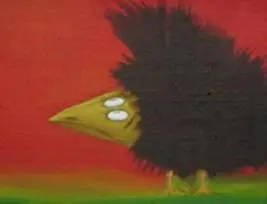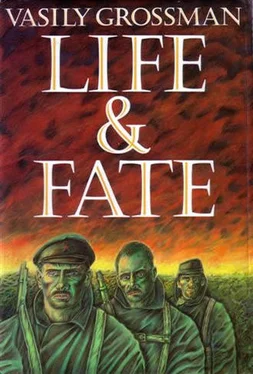They walked on in silence. They were together – and that was enough to make everything round about seem beautiful. And it was spring.
Still without saying anything, they came to a stop. Two fat bullfinches were sitting on the branch of a fir tree. Their red breasts seemed like flowers that had suddenly blossomed on enchanted snow. The silence was very strange.
This silence contained the memory of last year's leaves and rains, of abandoned nests, of childhood, of the joyless labour of ants, of the treachery of foxes and kites, of the war of all against all, of good and evil born together in one heart and dying with this heart, of storms and thunderbolts that had set young hares and huge tree-trunks trembling. It was the past that slept under the snow, beneath this cool half-light -the joy of lovers' meetings, the hesitant chatter of April birds, people's first meetings with neighbours who had seemed strange at first and then become a part of their lives.
Everyone was asleep – the strong and the weak, the brave and the timid, the happy and the unhappy. This was a last parting, in an empty and abandoned house, with the dead who had now left it for ever.
Somehow you could sense spring more vividly in this cool forest than on the sunlit plain. And there was a deeper sadness in this silence than in the silence of autumn. In it you could hear both a lament for the dead and the furious joy of life itself.
It was still cold and dark, but soon the doors and shutters would be flung open. Soon the house would be filled with the tears and laughter of children, with the hurried steps of a loved woman and the measured gait of the master of the house.
They stood there, holding their bags, in silence.
1960
***

[1] He did, however, continue writing until the end of his life. In the first place he completed the short novel Everything Flows which he had begun in 1955. [1] This part novel, part meditation on the fate of Russia contains a brief study of the camps (a Gulag Archipelago in miniature), some of the most eloquent and moving pages ever written on the fate of the Russian peasantry, and Grossman's reflections on Lenin and Russian history. Grossman was the first Soviet writer to argue Lenin's responsibility for the evils of Soviet society; other writers had laid the blame only on Stalin. During his last years Grossman also wrote several short stories that have yet to be published either in the Soviet Union or in the West, and 'Peace Be with You', an account of a journey to Armenia. This fine essay, Grossman's literary testament, has been published in the Soviet Union, though only in a censored version. There are a large number of important 'Soviet' writers who were brought up as members of the pre-Revolutionary intelligentsia: Pasternak, Bulgakov, Mandelstam, Akhmatova… Grossman, however, is a Soviet writer in a deeper sense; he will be remembered as both the first and the greatest of the dissidents of the post-Stalin era, the generation of dissidents who emerged from within Soviet Russia and who are themselves products of Soviet Russia.
Published in English translation in 1972 as Forever Flowing.
[2]The Jews of the Russian Empire, who were forced to live in special zones of residence, lived in small towns, shtetls, where they made up the majority of the population.
[3]Comrade, good, bread, soup, children, cigarettes, work… sickbay, block orderly, military police, extermination camp, roll-call, roll-call square, ablutions, flight point, camp guards.
[4]Lads, tobacco, comrade.
[5]+ Passage missing in the original text.
[6]++ General A. A. Vlasov was a Red Army officer who, after being captured by the Germans in 1942, formed an army of Russian prisoners to fight against the Soviet Union.
[7]The Russian Army on the right, or west, bank of the Volga, in the city of Stalingrad itself.
[8]A political officer was attached to each unit. The lowest rank was 'political instructor', the highest 'Member of the Military Soviet' for an Army or a Front. The intermediate ranks were 'battalion commissar', 'regimental commissar', etc. There was frequently friction between these political officers and the corresponding commanding officers.
[9]P. F. Yudin was one of Stalin's favourite hack philosophers.
[10]Based in the Kremlin, the Stavka was the Soviet equivalent of GHQ and was responsible for the strategic direction of the war.
[11] Kolkhoz: a collective farm.
[12] Obkom: the Party committee of an oblast or province.
[13] Nomenklatura: the register kept by the Party organs of persons professionally and politically eligible for posts of responsibility.
[14]An article condemning certain 'excesses' committed during collectivization -published when the famine resulting from the initial disasters threatened to get out of hand.
[15]This was in fact a death-sentence.
[16]Donskoy, Suvorov and Ushakov are Russian military heroes.
[17] Zemstvo: a local government institution.
[18]Byedniy was a mediocre propagandist poet at the time of the Revolution.
[19]Fet was a lyric poet of the late nineteenth century, a precursor of the Symbolists.
[20]Dobrolyubov (1836-61) and Chernyshevsky (1828-89) were among the ancestors of the Russian revolutionaries.
[21]Komsomol: the Communist Youth League.
[22] Dalstroy: the Far Eastern Construction Trust, i.e. the network of prison camps that covered thousands of miles of the far North-East of the Soviet Union.
[23]A barrack in a prison camp inhabited (solely or mainly) by professional criminals.
[24]One of the ultra-reactionary and anti-Semitic organizations responsible for the pogroms at the beginning of the century.
[25]Jug, plywood, puddle, sour milk, duckweed, scarecrow, lazy, kitten.
[26]A collection of poems by the Ukrainian poet T. Chevtchenko.
[27]Ulrich was President of the Military Collegium of the Supreme Court. He presided at several of the Great Purge Trials. N.I. Yezhov was People's Commissar for Internal Affairs, 1936-1938.
[28]Between 1923 and 1934 the Soviet security service was known as the OGPU (United State Political Administration).
[29]The Communist children's organization.
[30]A quotation from a poem by Heine.
[31]From a short lyric of Pushkin's.
[32]An anonymous twelfth-century epic poem.
[33]An allusion to Gogol's play, The Inspector: the governor tries to make out that a widow, whom he has had whipped, has in fact whipped herself.
[34]The Tsarist Secret Police.
[35]'This will make your voice beautiful!'
[36]'Caps off!'
[37]A quotation from a famous song about the Cossack chieftain, Stenka Razin.
[38]Cossack chieftain.
[39]Khrushchev.
[40]I.e. prisoners still capable of a full day's work.
[41]Common criminals who have broken the underworld code.
[42]A revolutionary organization of the nineteenth century.
[43]A light biplane.
[44]The Russian word khren is used in an expression meaning 'old sod'.
[45]A minister under Alexander I. Here he epitomises a narrow-minded and rigid bureaucracy.
[46]The subject of a famous story by Gogol.
[47]Dentist.
[48]An allusion to a passage in Rimsky-Korsakov's opera. Viktor is referring to the political authorities, perhaps to Stalin himself.
[49]A Tsarist political prison.
[50]A traditional custom: if guests at a wedding party shout, 'Bitter', then the bride and groom have to kiss.
[51]The famous writer was Boris Pasternak, his comrade Osip Mandelstam.
[52]'Tell me please, what is Makhorka?' (Makhorka is a coarse Russian tobacco.)
Читать дальше













